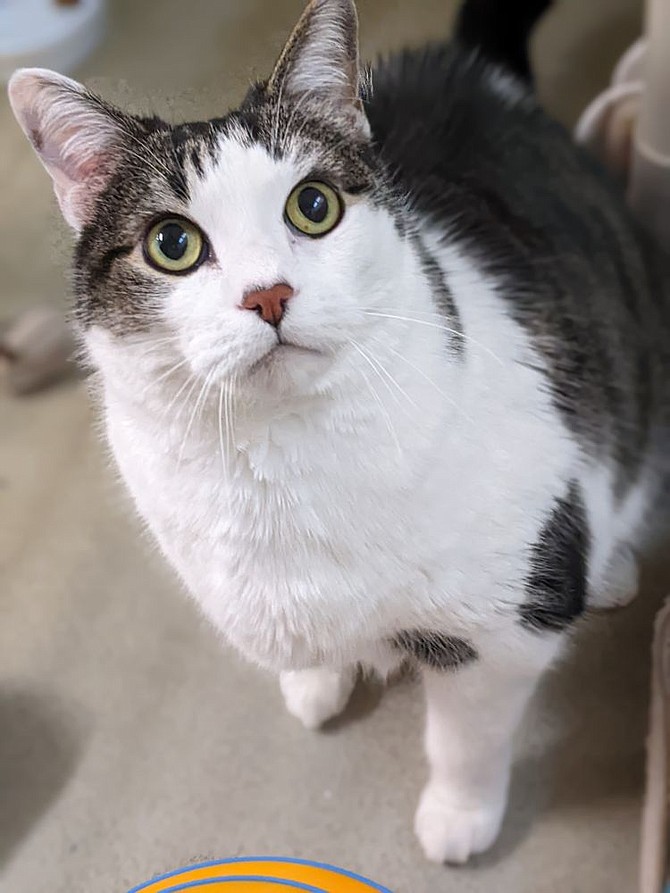A clever cat named Jazz learned several tricks while at the AWLA, but his excess weight may have slowed his adoption. Photo by Animal Welfare League of Alexandria
“Extra weight can strain joints, change body chemistry, cause the heart to work harder and even affect an animal’s ability to receive treatment for health conditions, especially if surgery is needed,” said Gina Hardter, Director of Marketing & Communications at the Animal Welfare League of Alexandria (AWLA). She said the AWLA team provides a healthy mix and amount of food for all animals in their care and consults the staff veterinarian about animals’ weight issues.
Often it’s overfeeding by well-meaning humans that causes a pet to put on extra pounds. Some pet owners don’t take calories into consideration when rewarding a pet with treats. “Just a few full-size strips of bacon-style treats for a dog can be the caloric equivalent of four doughnuts to an average-sized dog,” she said. Those same treats can represent nearly half of a dog’s entire daily calories, even more for a smaller pup.
It can be easy for a pet to slip from a healthy range to overweight and even obesity, Hardter said. Some common signs of weight gain in a pet can be no visible waist, lack of energy, trouble climbing stairs, increased panting and changes in appearance such as a dry or oily coat.
For example, one young dog who came to the AWLA weighing 100 pounds was deemed about 20 pounds overweight, Hardter said. He needed surgery on both of his back knees but was not a candidate for the procedure because his weight would have made recuperation impossible in the shelter environment. A five-year-old cat named Jazz awed people online with his ability to learn tricks through clicker training, but that didn’t translate into adoption interest, perhaps in part because Jazz was considered overweight for his size. Potential adopters at the AWLA may be intimidated by bringing home and working with a pet who needs to lose weight, but helping an animal successfully lose weight and become healthier can be highly rewarding.
A pet’s size can play into the amount of weight they can gain safely. While adding a pound or two may not be significant for a large-breed dog, it can be a huge shift for an animal weighing only 10 pounds. Another important factor in weight gain is the pet’s age. Just like people, when pets age, their body chemistry changes in a variety of ways, as do their daily energy needs. They may also slow down and require fewer daily calories. A veterinarian may recommend a change in diet for a senior pet to adjust for these changes.
Before making any significant adjustments in a pet’s diet to lose weight, owners should consult their veterinarian, as weight gain may not be related to diet at all. Vets may test an animal for conditions like hypothyroidism, which may cause a pet to gain weight. Additionally, some overweight pets may develop diabetes and require a specialized diet.
Besides changes to diet, many overweight pets can benefit from gradually stepping up their exercise routine, such as short walks for dogs and playing with wands and other toys for cats. A dog named Josie arrived at the AWLA barely able to walk as a result of arthritis and excess weight. The staff and volunteers looked for creative ways to get her moving, playing with toys and eventually taking short but frequent walks. When Josie was adopted, her new owners were also provided with guidance on how to keep Josie moving on her healthy path.
With a little work and extra attention, pet owners can help their beloved friends achieve and maintain an appropriate weight, resulting in better health, greater mobility and a longer life. Even a small change in weight can greatly improve quality of life, and it’s never too late to start.
The Animal Welfare League of Alexandria is a local 501(c)(3) organization that operates the Vola Lawson Animal Shelter, Alexandria's only open-access animal shelter. The AWLA impacts the lives of thousands of animals each year through adoptions and other programs. The AWLA also helps Alexandrians with questions about wildlife in the community. More than half of the AWLA’s budget is composed of donations. More information can be found at AlexandriaAnimals.org.
